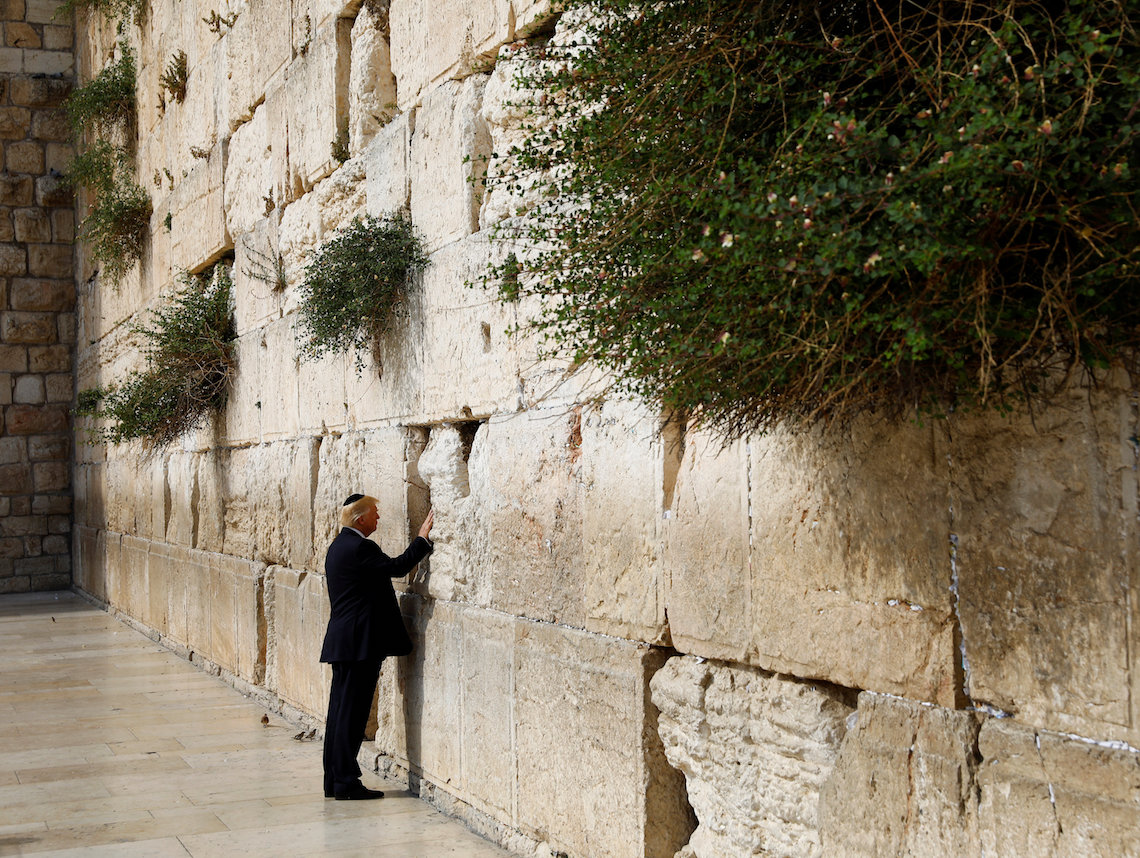 President Donald Trump touches the Western Wall on May 22. Photo by Ronen Zvulun/Reuters
President Donald Trump touches the Western Wall on May 22. Photo by Ronen Zvulun/Reuters President Donald Trump signed an order to renew the six-month waiver that allows the U.S. embassy to remain in Tel Aviv rather than moving it to Jerusalem.
As a candidate, Trump promised to move the embassy to Jerusalem, which was required by an act of Congress in 1995 but which successive administrations have delayed with a series of six-month waivers, citing national security concerns. The latest waiver, signed by Trump’s predecessor, Barack Obama, expired on Thursday.
Trump’s signing of the waiver was first reported Thursday morning by the New York Times, though there had been much speculation in political circles and in the media that he would do so.
“While President Donald J. Trump signed the waiver under the Jerusalem Embassy Act and delayed moving the U.S. Embassy in Israel from Tel Aviv to Jerusalem, no one should consider this step to be in any way a retreat from the President’s strong support for Israel and for the United States-Israel alliance,” the White House said in a statement announcing the signing of the waiver. “President Trump made this decision to maximize the chances of successfully negotiating a deal between Israel and the Palestinians, fulfilling his solemn obligation to defend America’s national security interests. But, as he has repeatedly stated his intention to move the embassy, the question is not if that move happens, but only when.”
Trump did not discuss the waiver publicly during his visit to Jerusalem late last month. He was, however, the first sitting president to visit the Western Wall. He has stated that he would like to broker the “ultimate deal,” a peace agreement between Israel and the Palestinians with the approval of the rest of the Arab world. He reportedly was convinced on his recent visit to Saudi Arabia and to the Palestinian Authority that moving the embassy at this time would imperil such a deal.
The United States, like most countries throughout the world, does not recognize Jerusalem as Israel’s capital. Israel calls all of Jerusalem its “undivided capital,” while the Palestinians consider eastern Jerusalem the capital of a future Palestinian state.
Israeli Prime Minister Benjamin Netanyahu in a statement issued by his office said that Israelis “disappointed” that the embassy will not move at this time.
“Israel’s consistent position is that the American embassy, like the embassies of all countries with whom we have diplomatic relations, should be in Jerusalem, our eternal capital,” the statement issued by the Prime Minister’s Office said. “Maintaining embassies outside the capital drives peace further away by helping keep alive the Palestinian fantasy that the Jewish people and the Jewish state have no connection to Jerusalem.”
“Though Israel is disappointed that the embassy will not move at this time, we appreciate today’s expression of President Trump’s friendship to Israel and his commitment to moving the embassy in the future,” the statement said.
J Street in a statement, welcomed Trump’s decision to sign the waiver, calling it “in keeping with 20 years of bipartisan policy” since the passage of the 1995 Jerusalem Embassy Act.
“J Street believes that Jerusalem is absolutely central to the history, culture and identity of the Jewish people. We look forward to it, one day, being recognized by the entire world as Israel’s capital, as part of a negotiated two-state solution,” the statement also said.























 More news and opinions than at a Shabbat dinner, right in your inbox.
More news and opinions than at a Shabbat dinner, right in your inbox.